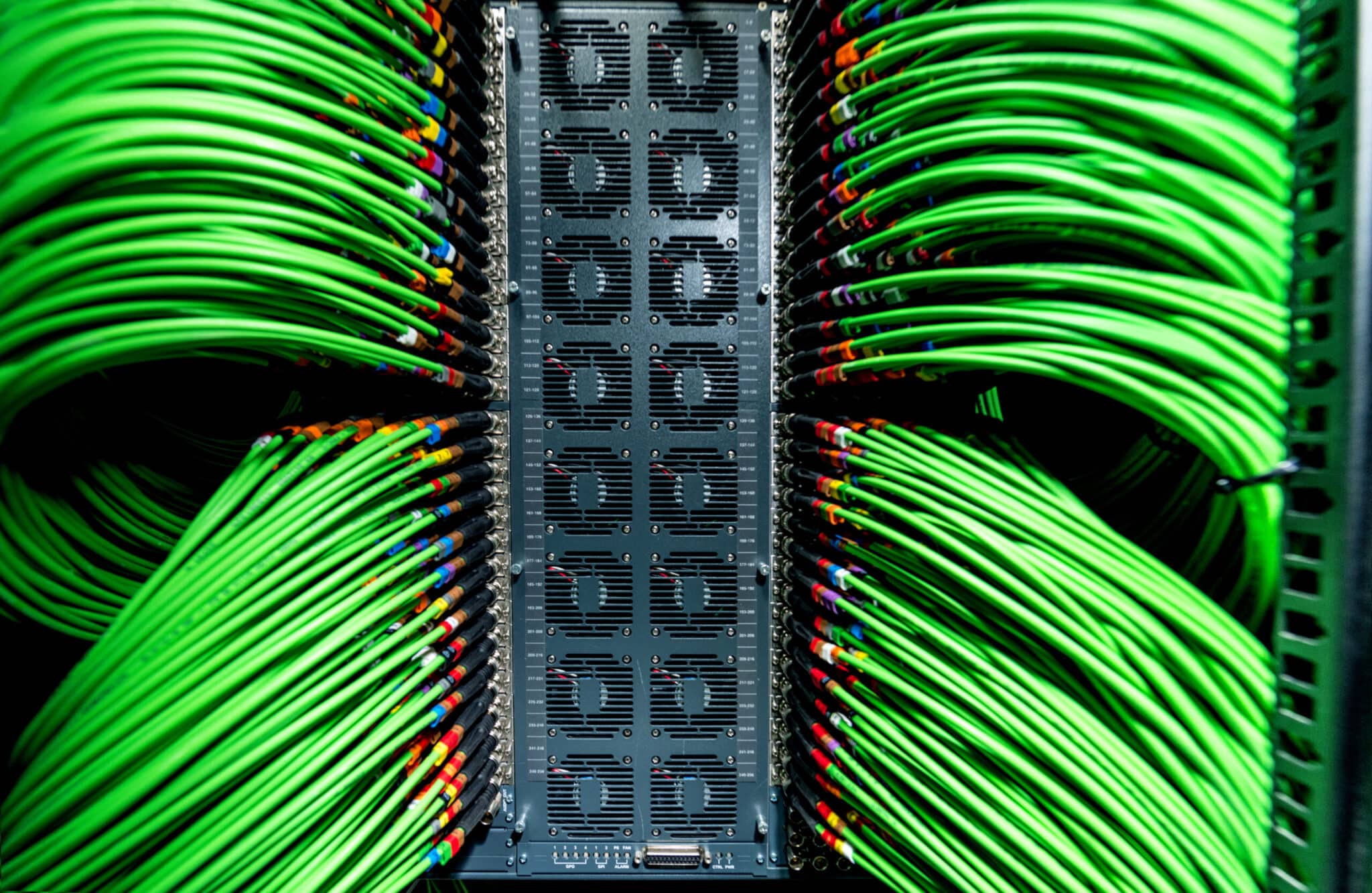Are you looking for a new hosting plan to handle increased web traffic, but don’t know where to start?
Maybe it’s time to check out some dedicated hosting options.
If you choose the wrong hosting plan for your high-traffic website, you could experience site downtime and lose consistent traffic.
Have no fear, though — dedicated hosting services can save the day and leave you with the utmost flexibility for your site.
As someone who’s been designing websites and working in tech for over a decade, I have a lot of experience with all types of web hosting — including dedicated hosting.
So, here’s a beginner’s guide to help you familiarize yourself with the ins and outs of dedicated hosting before you choose which service is right for you.
Let’s get into it!
What is a Server?

Before we delve into the specifics of dedicated hosting, it’s important to define the role of servers in web hosting.
Quick note — if you’re not sure what web hosting is, look over this guide to get some background information. This article will make much more sense then.
A web server is a combination of software and hardware that employs Hypertext Transfer Protocol (HTTP) — as well as other protocols — to respond to requests from clients over the Internet.
Huh?
Essentially, web servers store, process, and deliver webpage content. This is what makes it possible for us to see website information when browsing online.
When web browsers (such as Google Chrome) need a file to display a web page, they’ll request it from the web server by HTTP.
To host websites from your computer, you must have some web server software.
It’s essential for all web hosting.
Different types of web hosting services offer other server options.
For example, shared hosting gets that name because, for that type of web hosting, multiple sites are sharing the resources of a single server.
What about dedicated hosting, though?
What is Dedicated Hosting?
Dedicated hosting is a hosting option wherein a physical server (or even multiple servers) is dedicated to one business or customer.
In this case, the business customer has the utmost control over how to use the server’s resources.
This freedom comes with many optimization opportunities for metrics like performance, site security, site speed, and more.
If you’ve opted for a dedicated hosting service, you won’t have to share your server’s storage or bandwidth with any sites that aren’t your own.
As such, you can have multiple small-to-medium sites on one server or one site on one server. It’s up to you.
Dedicated hosting is more expensive than shared hosting because of all of the extra features and control you gain.
It’s a stellar option for site owners who are expecting tremendous site growth and increased traffic. You’ll need more bandwidth, security, and performance flexibility if this is you.
How Does Dedicated Hosting Work?
Dedicated hosting provides site owners unfettered access to their site server.
A web hosting provider or service, like Bluehost, HostGator, and most others on the market supply this access.
Hosting providers also usually provide 24/7/365 technical support in your dedicated hosting plan. That way they can assist with uptime and any potential errors on your site.
Most site owners opt for managed hosting plans with their dedicated hosting packages.
A managed hosting plan means that your hosting provider’s team will take care of maintaining server hardware infrastructure. This is a superior option for site owners who aren’t necessarily computer science geniuses.
Dedicated Hosting Pros and Cons
Pro: Dedicated Hosting is Reliable
Having a dedicated server is the perfect way to make sure you’re prepared for any site traffic surges, now and in the future.
This could be from promotional campaigns or marketing initiatives – whatever it may be, having an extra layer of protection from downtime or site errors will give you a competitive edge over other sites that don’t.
Dedicated hosting plans come with ample bandwidth to handle large amounts of traffic.
As such, your site will reliably stay accessible to web browsers instead of falling victim to downtime.
Pro: Dedicated Hosting Gives You Full Server Control
Unlike a shared server, a dedicated server grants you complete command over the configurations of the system.
You can have root or admin access to modify and adjust every part of your server including software, hardware specifications, and its operating system (OS).
This way, you can optimize each element for the best and most relevant performance on your site.
Pro: Dedicated Hosting is Safer and More Secure
If your business deals with sensitive information such as customer details, credit card numbers, etc. a dedicated server can help you reinforce the security of your website.
Dedicated hosting servers are generally safer because they don’t share space with multiple sites.
With a dedicated server, there will be one IP address specifically for you that would give access to tailor-made safety protocols based on the requirements of your site.
However, you also have options to enhance your security through additional software.
In managed dedicated hosting plans, your host provider will usually supply you with an SSL certificate, malware protection, hard-to-crack passwords, and regularly update software to keep it hacker-free.
Now, let’s look at some of the cons of dedicated servers.
Con: Dedicated Servers are More Expensive
Opting for dedicated web hosting is guaranteed to cost more than shared, Cloud, or cPanel hosting.
After all, you’re the only one paying the fee!
Although this type of hosting can sometimes exceed a small business budget or startup company’s resources, it is something worth considering if your company grows in time.
Con: Dedicated Servers Require More Technical Skills
With shared hosting, the service provider will automatically take care of everything for you.
However, dedicated hosting requires technical expertise in server administration and management — unless you’re buying managed hosting.
Although it is possible to acquire fully-managed dedicated hosting from your service provider at an additional cost, any unmanaged work required with a dedicated server must be done by yourself.
Dedicated Hosting Comparisons
If your website is part of a shared hosting plan, that means that it’s sharing its server with multiple other users/accounts/sites.
This option is more affordable than dedicated hosting but comes with limited bandwidth and other resources like memory and disk space.
Sites on a shared server are more likely to experience downtime than dedicated server websites.
With a shared hosting account, you can access a cPanel to manage site-specific tasks and some server analytics. However, you won’t have much administrative access to configure your server’s software.
This is the type of control you get with dedicated hosting.

Dedicated Hosting Vs. Cloud Hosting
Cloud servers offer similar performance, control, and security features to dedicated servers.
However, they’re hosted in a “virtualized” setting managed by your cloud hosting provider.
This innovative solution allows you to completely customize server operations without hardware or maintenance requirements.
Think of cloud hosting as a combination of shared and dedicated hosting without actual hardware.
With cloud hosting, you can get similar affordable prices as you would with shared hosting, as you only pay for the space you use. And, you can easily scale up and down!
Please read our full guide on dedicated hosting vs cloud hosting here!
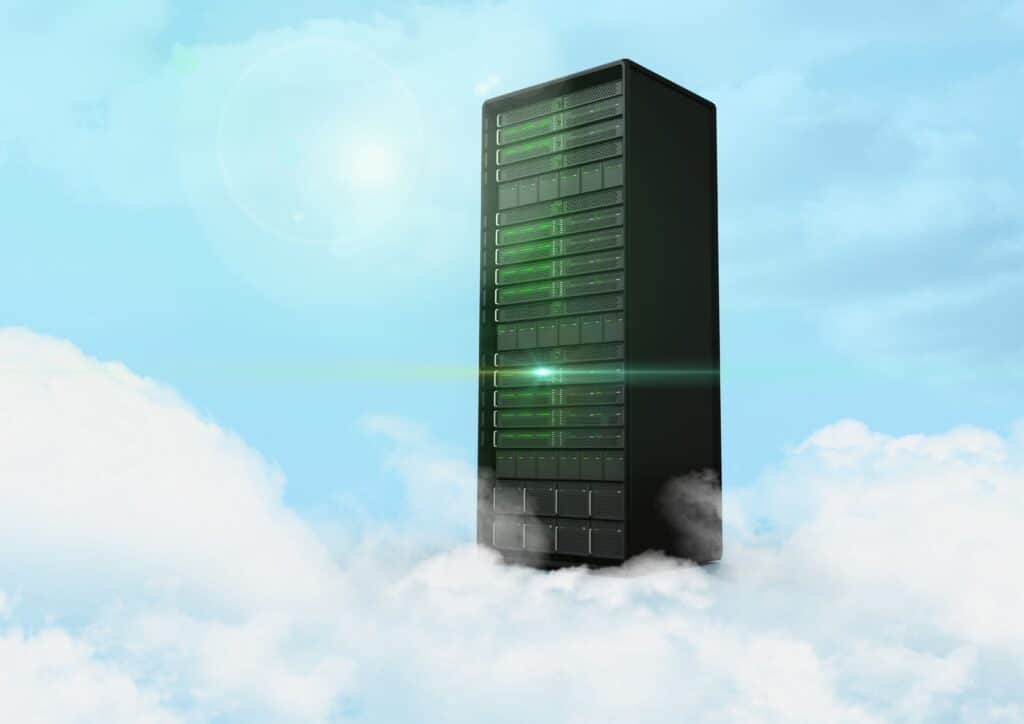
Dedicated Hosting Vs. VPS Hosting
Website owners who experience more traffic than what is allowed in shared hosting plans but are not yet ready for a dedicated server usually opt to go with VPS (Virtual Private Server) hosting.
This perfectly balances the cost and resources required to provide online services adequately.
Though a VPS entails sharing resources with other users, your website is allocated its dedicated portion of the server.
You can, therefore, rest assured that your site will have exclusive access to the necessary input and output it requires to run efficiently.

When Should You Use Dedicated Hosting?
Dedicated hosting is the best option if you’re looking for more resources and more server customizability.
With this hosting approach, you have complete control over your server’s hardware and software.
Thus, you can specifically choose things like which processor to use.
It can be tough to fully assess what you need for your site with a dedicated server. It can often be too advanced of an option for tech novices.
Best Dedicated Hosting Services
For a full overview of the TYB Team’s favorite dedicated hosting services, check out this article. In the meantime, here are a few favorites.
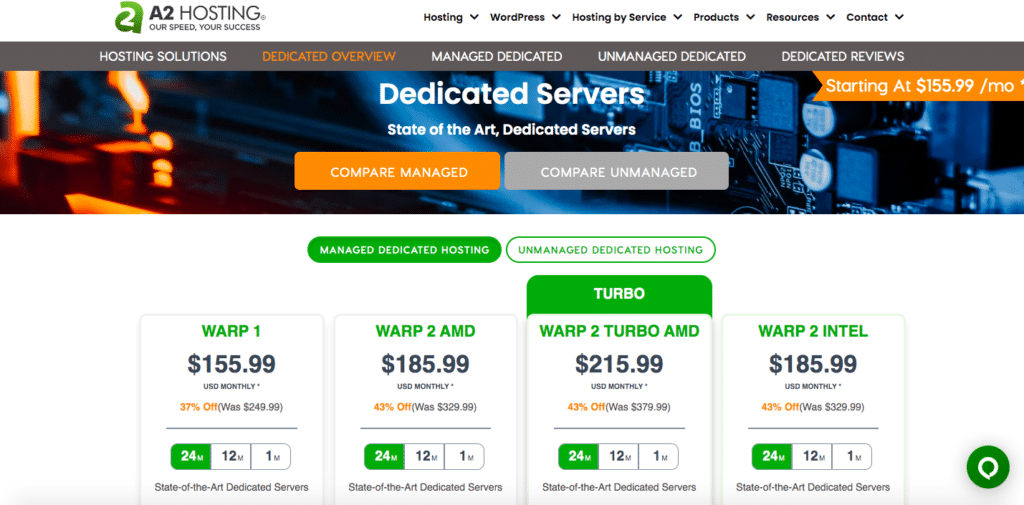
A2 Web Hosting offers seven dedicated hosting plans that range from $155.99/mo to $505.99/mo.
These plans have a variety of processors and storage levels, but they all come with fully managed features.
You can depend on A2 for stellar uptime and reliably fast speeds.
Checkout our full A2 hosting review here.
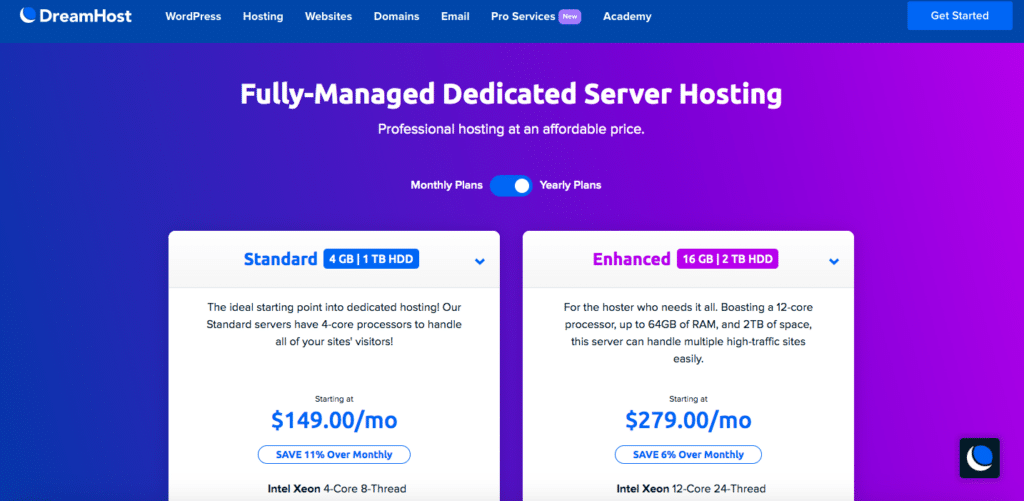
DreamHosts’ dedicated servers are also fully managed, all with Intel cores and generous RAM storage.
These plans range from $149/mo to $379/mo, so they’re slightly more affordable than A2.
DreamHost is known for its amazing uptime and insanely responsive customer service, available 24/7/365.
Checkout our full Dreamhost review here.
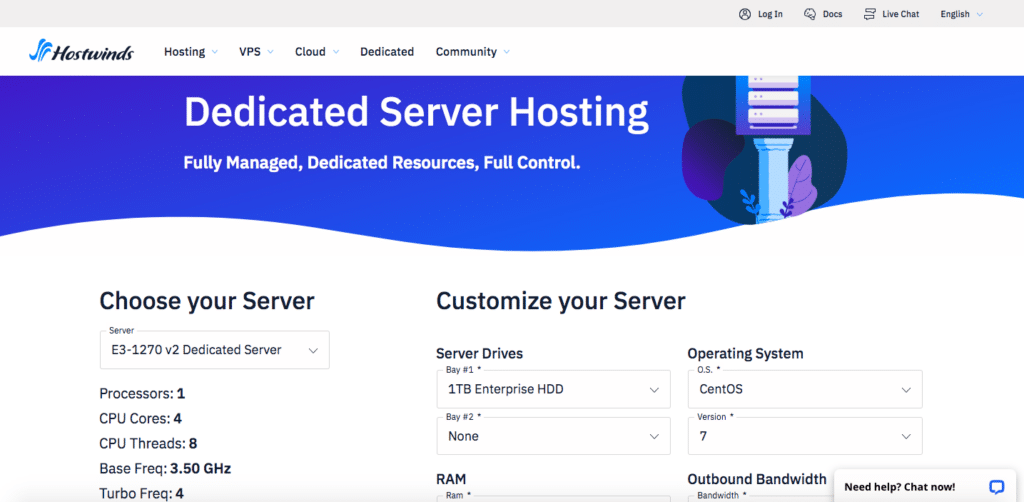
Hostwinds offers advanced dedicated customizability.
They allow you to choose your server based on processors, CPU cores and threads, and base and turbo frequency.
Furthermore, you can choose your operating system, bandwidth, RAM, and # of IP addresses.
From there, Hostwinds will add up your cost.
This is an amazing option for people looking to host websites under super-specific conditions.
Check out our Hostwinds review for a more in-depth look to see if it’s right for you.
Dedicated Hosting Conclusion
Dedicated hosting is the way to go if you’re looking for superior storage, security, control, or bandwidth.
As we’ve seen in this article, plenty of options are available that suit various budgets and needs.
Make sure dedicated hosting is your best option before you choose a plan from your web hosting provider.
Best wishes with getting your site(s) up and running!
‘Til next time.

Dedicated Hosting FAQ
Dedicated hosting is a type of web hosting that allows you to have your own physical server without having to share it with any other accounts or websites.
Dedicated hosting is great for tech-advanced individuals or companies looking for extra storage, bandwidth, security, and flexibility.
Some benefits of dedicated hosting are customizability with your server and larger amounts of resources like storage and speed.
Dedicated hosting is an excellent option for specific cases. All web hosting has its place!
My top three reasons for using a dedicated host include server stability, speed, and storage.

